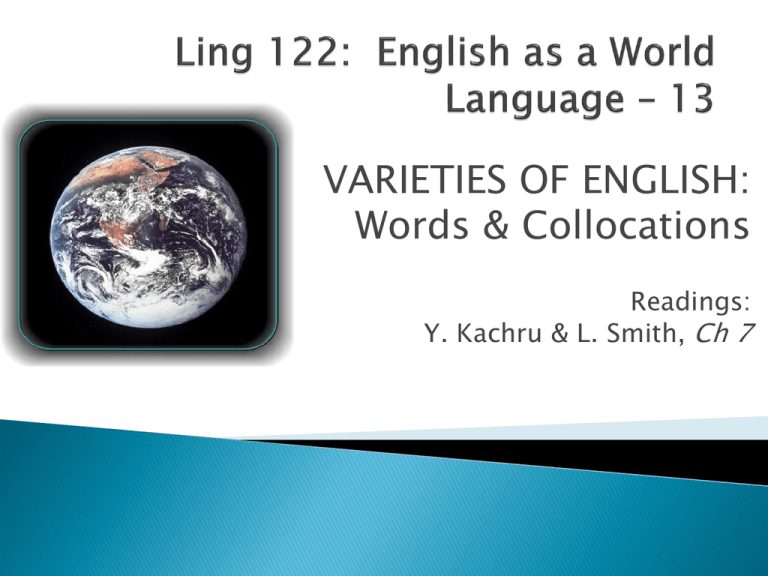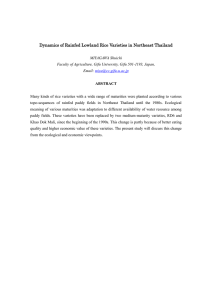VARIETIES OF ENGLISH: Words & Collocations Ch 7 Readings:
advertisement

VARIETIES OF ENGLISH: Words & Collocations Readings: Y. Kachru & L. Smith, Ch 7 How varieties of English, native and non-native vary in terms of their ◦ Sounds and rhythms ◦ Phrases and sentences We also saw how these variations among nonnative varieties of English are often the result of transfer from the native language of the speakers. In this lecture, we will look at how varieties of English differ in terms of their words (lexicon) and collocations. Who is Rush Limbaugh? Why has he been in the news recently? What’s your opinion of his actions in this particular case? Why do you feel that way? Who are Terry Gross and Geoff Nunberg? A four-letter word Why does Nunberg speculate that people have reacted so strongly againts what Limbaugh said? From NPR’s ‘Fresh Air’ with Terry Gross What’s the difference between Ed Schultz’ use of the word last year and Rush Limbaugh’s recent use of the word? Is the word ‘slut’ obscene and indecent, or is it a sexist slur? What’s the difference, if any, between ‘slut’ and ‘player’? What’s the difference, if any, between ‘slut’ and ‘queer’? What’s the original meaning of ‘slut’? Why did people find it offensive? From: Lowenberg, Non-native Varieties of English: Nativization, Norms, and Implication, pp. 5-6. What do these mean? 1. My friend wants to go down the bus 2. Did you know that Richard is moving with Eunice? 3. Britain derecognized the DK in 1979. 4. This is an outstation call. 5. He overlistened to the boys’ conversation. 6. Most of the students here are bed-spacers. 7. Our son is England-returned. 8. You have to be careful with these been-to boys. 5 In the previous two chapters, we saw how cultures adopt English either ◦ as a lingua franca or auxiliary language within a country (e.g., India, Nigeria, Singapore, all Outer Circle countries) or ◦ as a language of wider communication for use with speakers of other languages more globally (e.g., Japan, Thailand, China, all countries). Expanding Circle We also saw how, in the process of doing so, the varieties of English used in these contexts may change in terms of ◦ Pronunciation or ◦ syntax These changes are the result of language contact and often transfer of linguistic features from the first languages of those cultures. These changes are often collectively referred to as ‘nativization’ (or ‘indigenization’): ◦ The adaptation that a language may undergo when it is used in a different cultural and social situation. ◦ Indian English, Nigerian English, Singapore English, etc. for example, are said to have undergone nativization because changes have occurred in aspects of their phonology, and syntax. Nativization also occurs in the areas of ◦ Lexicon (vocabulary) and ◦ Collocations (the ways in which words are regularly used together) Borrowings: ◦ Into American English: cayote, bayou, canyon, depot, kowtow, chintz, etc. ◦ Into other varieties of English: jitney (Phillipines), krengcai (Thailand), etc. Loan translations: ◦ chewing stick (African varieties), sacred thread (India), head-tie (Africa), etc. Semantic shift: ◦ father, uncle/aunt (many varieties), beauty (Thai), seven (Thai), etc. Shifts in form class (e.g., from adjective or noun to verb): tantamounts, doesn’t worth, etc. Productive derivational processes: prepone, overstand, downpress, etc. Neologisms (newly coined words): mozzie (‘mosquito’), pollie (‘politician’), chooch (‘jackass, moron’), etc. New idioms and metaphors: ‘to write it down in my head’ (South Africa), ‘Give me chance/way’ (Ghana), etc. Bokamba, Africanisms in African English “When a Nigerian or a Ghanaian speaks English, no matter what his/her level of education, native speakers of English have no difficulty identifying the accent as African.” Africanism These Englishes share certain properties that can be identified as Africanisms, in that they reflect structural characteristics of African languages. 12 Bokamba, Africanisms in African English 1. Example of Syntactic Construction With much pleasre [pleasure] and respect I inscribe you this few lines and with the hope that it will meet you in good condition of health. [Bokamba, p. 126]. Q: What are the non-STD American usages? 13 Bokamba, Africanisms in African English 1. Adjectival Agreement Africanism this few lines STD English these few lines “Most African languages do not require overt agreement markers between a noun and its modifier..” 14 Bokamba, Africanisms 2. Subject Verb Agreement In STD English the subject NP of a sentence requires that the form of the verb agrees with whether it is singular or plural where possible (in all third person present tense): Arthur sleeps in a bed The twins sleep in a bunk Kim lives in Berkeley Yoko and Arthur live in Richmond “With much pleasre [pleasure] and respect I inscribe you this few lines and with the hope that it will meet you in good condition of health.” 15 Bokamba, Africanisms 3. Word Choice “In many African languages the verbs find, meet, and encounter are realized by a single verb which is often the equivalent of meet in English.” “With much pleasre [pleasure] and respect I inscribe you this few lines and with the hope that it will meet you in good condition of health.” 16 Class Exercise: What do these mean? My friend wants to go down the bus. *My friend wants to go down the bus = get off Did you know that Richard is moving with Eunice? *Did you know that Richard is moving with Eunice? = courting Britain derecognized the DK in 1979. *Britain derecognized the DK in 1979.= withdraw diplomatic recognition This is an outstation call. *This is an outstation call. = out of town 17 He overlistened to the boys’ conversation. *He overlistened to the boys’ conversation. = eavesdropped Most of the students here are bed-spacers. *Most of the students here are bed-spacers. = room renters (no board) Our son is England-returned. *Our son is England-returned. = come back from England You have to be careful with these been-to boys. *You have to be careful with these been-to boys. = who have returned from England Class Exercise: Distinctive collocations and idioms noted in Pakistan, Nigeria and Ghana (Cf. Crystal) Example Provide Meaning Senior Wash mouth Morning meal Baby lawyer Hear French Declare a surplus Take in Give me chance/ way I am not financial 19 Answers: Distinctive collocations and idioms noted in Pakistan, Nigeria and Ghana Senior Wash mouth Morning meal Baby lawyer Hear French Declare a surplus Take in Give me chance / way I am not financial elder brush teeth breakfast young lawyer understand throw party become pregnant let me pass have no money 20 Class Exercise: Distinctive Features of STD Nigerian English (From Changing English, p. 151) STD Nigerian English STD American English? 1. Equipments 2. Enable him do it 3. I am going to voice out my opinion 4. We shall discuss about that later 5. I congratulate you for your brilliant performance 6. The politicians and their supporters, they don’t often listen to advice. 7. A person who has no experience, can he be a good leader? 8. To barb 9. Bala 21 Class Exercise: Distinctive Features of STD Nigerian English (From Changing English, p. 151) STD Nigerian English Bush meat: ‘We will hunt some bush-meat’ game White-cap chiefs senior chiefs in Lago whose rank is shown by the white cap Environment: ‘This environment is nice’. neighborhood At now: ‘They have not arrived at now.’ yet 22 Off-head from memory To take the light to make a power cut (electricity) Social wake-keeping feasting and drumming To wet: ‘I will wet my plants’ to water (flower) Globe: ‘Can you change the globe, please!’ electric light bulb To land one’s speech to finish one’s speech Juju music a type of dance music Bluff to give an air of importance Bokamba, Africanisms 4. Greeting Style (Cultural) “African languages characteristically inquire about or make reference to an addressee’s welfare as an initial step in either face-toface greetings or letter writing.” 25 Chinese: Have you eaten? Lao:Good health. Thai: Where are you going? American English: Hey, Dude! How are you ! How have you been ! Other cultures? How do you greet? To whom? When? Where? In what context? How do these changes become the standard form of Outer Circle varieties of English? Codification: use of this variety in media, literature, publication of style sheets, grammars, dictionaries, etc. Lexicography: The art and science of dictionary making There is a continuum or cline of varieties, ranging from less educated non-standard to educated varieties Basilect Least standard Mesolect Colloquial Acrolect Educated variety Some items have only a very restricted use, that is, they are used for specific registers “Th-th-th-that's all folks!" 29
